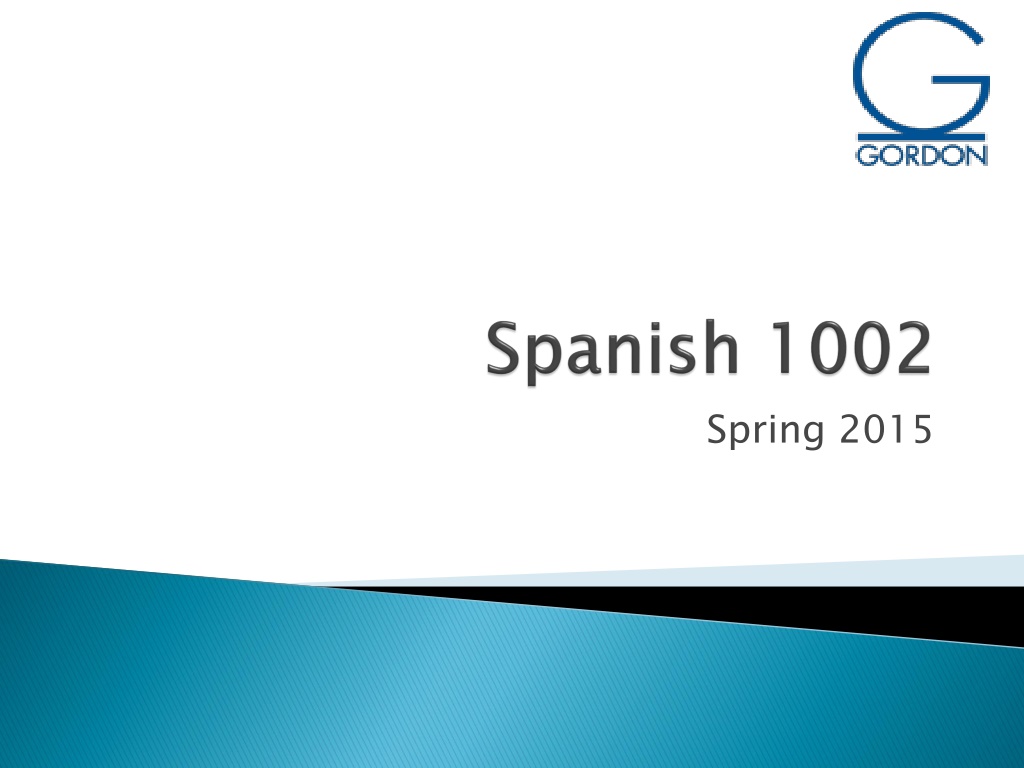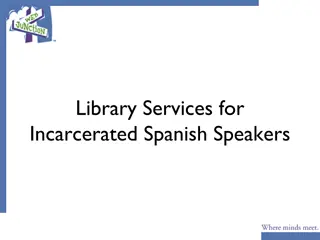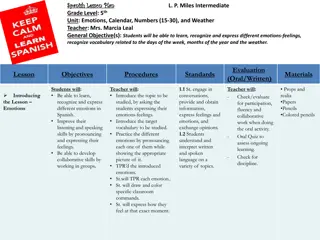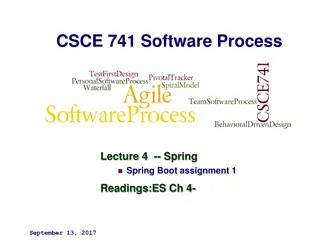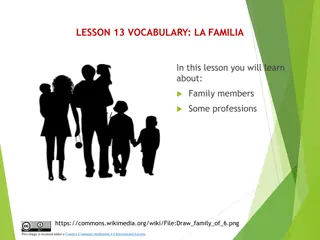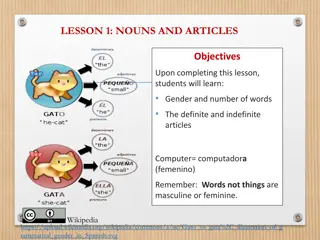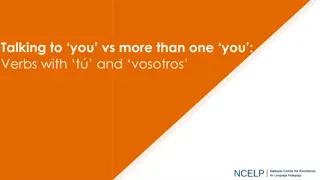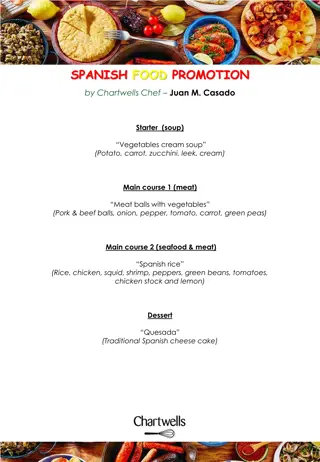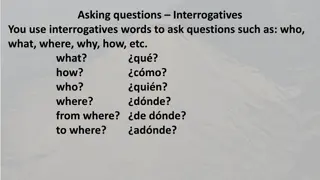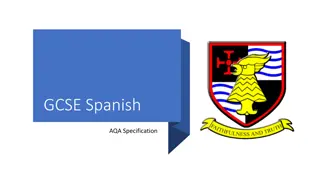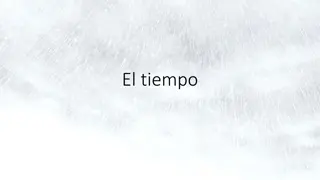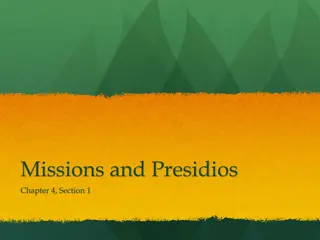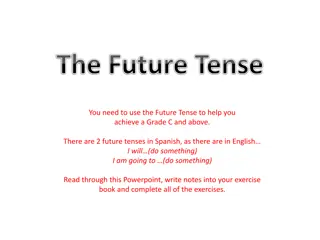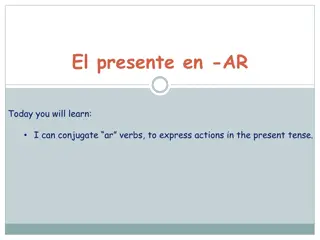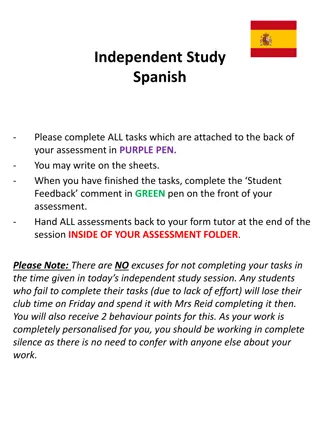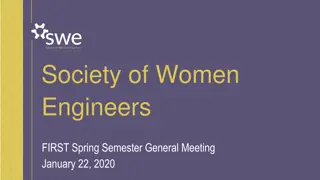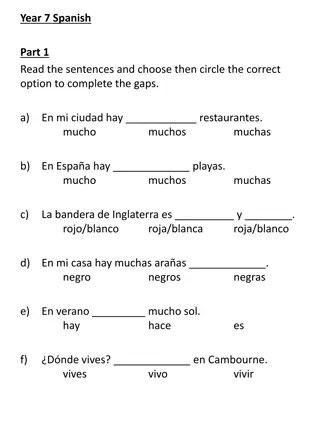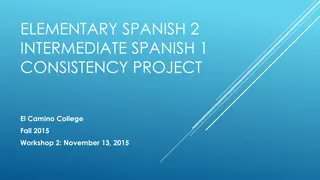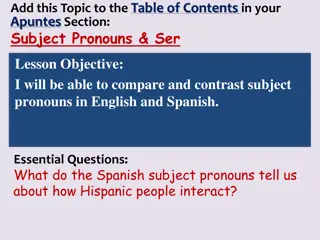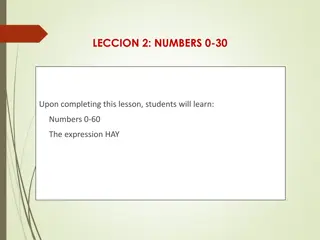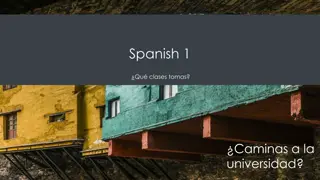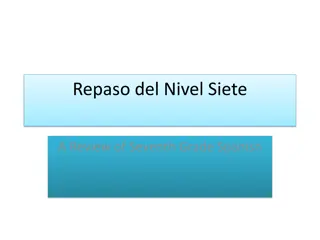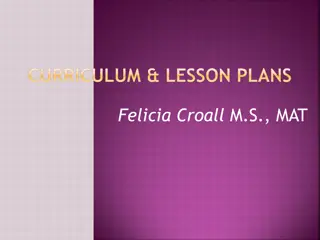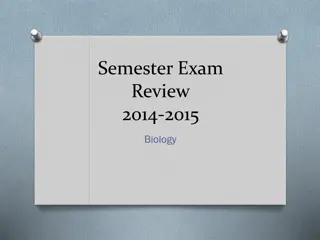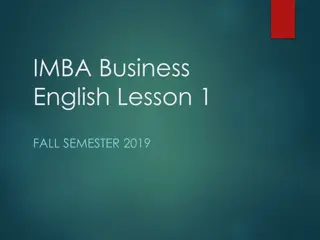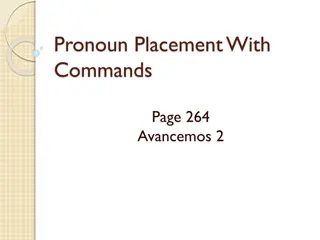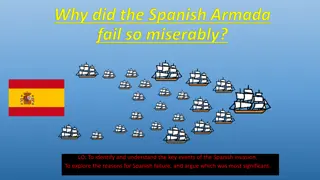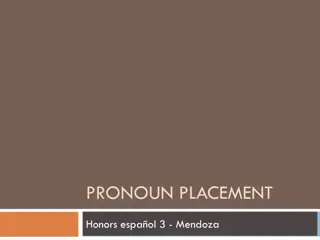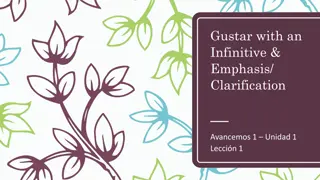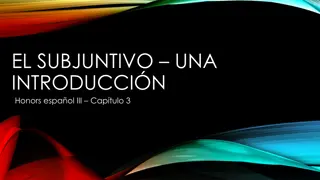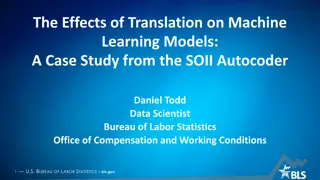Spanish Lesson Activities for Spring Semester 2015
Engage in a variety of activities including self-introductions, vocabulary exercises, verb practice, and more in your Spanish class for the Spring semester of 2015. Explore topics like clothing vocabulary, verb conjugations, object pronouns, and past tense usage. Enhance your language skills through interactive tasks and lessons.
Download Presentation

Please find below an Image/Link to download the presentation.
The content on the website is provided AS IS for your information and personal use only. It may not be sold, licensed, or shared on other websites without obtaining consent from the author. Download presentation by click this link. If you encounter any issues during the download, it is possible that the publisher has removed the file from their server.
E N D
Presentation Transcript
Introduccn Vamos a presentarnos. Incluye: 1. Nombre 2. Carrera 3. Origen 4. Poco de la familia 5. Pasatiempos 6. Horario Tres minutos para presentarse. Hay que hablar con por los menos cuatro personas. Vocabulario, lecc n 6 2
Vocabulario (p.190-192) Lesson 6 ropa (CROSSWORD) 3, 4 (p.191), 5-6 (p.192) 7 (p.193) Que ropa llevas? Quien lleva .? Verbos saber/conocer 3
Verbos saber/conocer Conocer + personas, lugares Saber + informacion, + infinitivos TAREA: supersite, intentalo, 1, 2 (p.203-204) 4
SABER/CONOCER SABER/CONOCER --MORE PRACTICE INDIRECT OBJECT PRONOUNS I INDIRECT OBJECT PRONOUNS II Indirect objects P. 204 1, 2, 3 5
IOPS REPASO 1.El dice la verdad a Mar a. 2.Yo doy un regalo a sus hijos. 3.Ella manda el paquete a sus primos. 4.Carlos escribe una carta a su amiga. 5.Vamos a contar el episodio a ti. 6
Complete the following sentences with the appropriate direct or indirect object pronoun. 1.Mar a visita a su abuela. Mar a _____ visita. 2.El se or ve a su amigo y da la mano a su amigo. El se or ______ ve y ______ da la mano. 3.El revisor devuelve los billetes a los pasajeros. El revisor ______ devuelve los billetes. 4.La chica sabe los resultados. La chica ________ sabe. 5.El padre lee el cuento a su hijo. El padre _______ lee el cuento. 7
INDIRECT OBJECT PRONOUNS INDIRECT OBJECT/DIRECT OBJECT PRONOUNS 8
Preterito When do we use it? How do we form it? 9
(hablar) 1. Ayer yo______ con mi mam por tel fono. (vivir) 2. D nde t _____el a o pasado? (estudiar) 3. Ellos_____ conmigo el semestre pasado. (abrir) 4. Mar a ____la puerta y entr . (bailar) 5. Carla y yo_____ toda la noche. (beber) 6. Uds. _____mucha cerveza anoche. (recibir) 7. La semana pasada nosotros____ las noticias. 10
1. Qu pasa? Qu ______ayer? 2. Uds. leen la novela? Ya______ la novela? 3. Viajas mucho? ______mucho el a o pasado? 4. Toco la guitarra todos los d as, pero ayer no_____ la . 5. Siempre cenamos a las ocho, pero anoche ______a las seis. 6. Casi nunca les escribo cartas a mis padres, pero el fin de semana pasada les _______ una. 7. A qu hora llegan tus padres? A qu hora ______? 11
PRETERITE WORKSHEET Demonstratives What are they in English? Difference between demonstrative adjective and demonstrative adjective? 12
Este/ Este/esta esta Estos Estos/ /estas estas Ese/esa Esos/esas Aquel/aquella Aquellos/aquellas 13
Intentalo, 1, 2 (p.211-212) Demonstrative extra 14
Test format: La ropa (you will selecto 5 of 10 words to define in) Saber vs. conocer Preterite or regular verbs; remember verbs that end in car, gar, zar Indirect object pronouns Describe what you did last weekend. Use at least 5 different verbs in the preterite tense. Reading section? Review worksheets/exercise completed in class. 15
Quiz 2 Vocabulario (leccion 7) Oral test 1 (February 3, Tuesday) Oral Test 1 Oral Recording 1 16
What is a reflexive verb in English? What are the reflexive pronouns in English? Must we always include reflexive pronouns with reflexive verbs in English? Must reflexive pronouns be included in Spanish? What are the reflexive pronouns in Spanish? Intentalo p.237 17
Review reflexives in text 6 (p.228), intentalo (p.237), 1-3 (p.238) 18
algo something; anything nada nothing; not anything alguien somebody; somebody; anyone nadie no one; nobody; not anyone alguno/a(s); alg n some; any ninguno/a, ning n no; none; not any o oeither or ni nineither nor siempre always nunca, jamas never; not ever tambi n also; too tampoco neither; not either 19
1.Tengo algo en mi mochila. (I have something in my backback) 2.Alguien est en el ba o. (Someone is in the bathroom) 3.Hay algunas mujeres en la biblioteca. (There are some women in the library) In Spanish, it is correct to form double negatives unlike English. For the first three sentences we want to first give the opposite of the indefinite words: algo-nada, alguien- nadie, algunas-ninguna. Also, we actually can write these sentences two ways. If we put the negative word directly before the conjugated verb we will leave out the no while if we include the no, the no will precede the conjugated verb, and the negative word will follow the conjugated verb. 20
If the negative words come first then: 1.Nada tengo en mi mochila. (I have nothing in my backback) 2.Nadie est en el ba o.(Nobody/no one is in the bathroom) 3.Niguna mujer hay en la biblioteca (There is no woman in the library) We don t want to use ningunas; rarely, is it used) . We must change alguna(s) to ninguna and alguno(s) to ninguno. If the no comes before conjugated verb: 1.No tengo nada en mi mochila. 2.No est nadie en el ba o. 3.No hay ninguna mujer en la biblioteca. 21
Lets look at numbers 4 and 5. 4. Hay alg n plato en la mesa. (There is a [some] dish on the table) 5.Hay algunos platos en la mesa. (There are some dishes on the table) Alguno and ninguno are shorted to alg n and ning n before a masculine singular noun, and as mentioned earlier, normally the plurals ningunos and ningunas are not used. Let s write number 4 and 5 in the negative: 4.Ning n plato hay en la mesa (or) No hay ning n plato en la mesa. 5.Ning n plato hay en la mesa (or) No hay ning n plato en la mesa. (There is no dish or there are no dishes on the table-translations for 4 and 5) 22
6.Voy a comprar o zaptaos o sandalias. To change to the negative in the sentence just substitute the o with ni but remember to include a no before the conjugated verb. No voy a comprar ni zapatos ni sandalias (I m not going buy either shoes or sandals/I m going to buy neither shoes nor sandals) 7.Siempre bebo agua en la playa (I always drink water at the beach) For # 7, let s write two ways: No bebo nunca agua en la playa (or) Nunca bebo agua en la playa (I never drink water at the beach/I don t drink water ever at the beach) 23
7.Siempre bebo agua en la playa (I always drink water at the beach) For # 7, let s write two ways: No bebo nunca agua en la playa (or) Nunca bebo agua en la playa (I never drink water at the beach/I don t drink water ever at the beach) 8.Tambi n quiero ir a playa (I also want to go the beach) For #8, let s write two ways: Tampoco quiero ir a playa (or) No quiero ir a la playa tampoco (I don t want go to the beach either) Supersite exercises due: Feb 2 (Monday) 24
Indefinite words Indefinite words Reflexives Oral Test 1 25
Ser/ir What do these two verbs have in common in preterite? Ser/ir Ser/ir 26
Verbs like gustar Unlike most of the verbs covered in this course, what makes this stand out? What pronoun does the liking and how do we determine subject? Typically, how many conjugations are employed with these verbs? Similar verbs aburrir, importar, encantar, faltar, fascinar, interesar, molestar, quedar 27
Review: 1, 4, (p.249) Verbs like gustar Supersite work due: February 9 (Tuesday) Quiz 2: February 12 (Thursday) Supersite work due: February 9 (Tuesday) Quiz 2: February 12 (Thursday) 28
Repaso, leccion 7 4 (p.239), 2 (p.243), 4 (p.249) Recap (p.250) Lesson 7 quiz review 29
Quiz 2 Supersite exercises due: 2/16/2015 (Monday) Supersite exercises due: 2/16/2015 (Monday) 30
Vocabulario, lesson 8 3, 4, P.263 Stem changing verbs, preterite 31
Are there ar, er stem changing-verbs in preterite? Are they easy to recognize? Where does the stem-change take place? Stem-change is e to what? And o to what? Intentalo, completar (p.274-275) 32
Stem changing verbs: preterite 1 Stem changing verbs: preterite 2 Supersite due: 2/18/2015 Supersite due: 2/18/2015 33
Repasar los ejercicios 1, 2 (p.275) STEM-CHANGING VERBS PRETERITE (CROSSWORD) Double object pronouns Double object pronouns 1 Double object pronouns 2 34
Repasar IOPS/DOPS 4 (p.280) 35
Comparison of inequality M s/menos + noun + que noun adjective adverb 1. Tengo m s enemigos que amigos 2. Gloria es menos alta que Elena 3. Trabajo m s rapido que tu. 4. Tengo m s de cinco dolares (Not que ) With numbers, we use de With numbers, we use de 36
With just a verb: ms/menos que Corro Comparison of equality Tan + adjective + como + noun (as..as) Juan With just a verb: Verb + tanto como+ noun (as much as) Fumo Tanto + noun + como (as many ..as) Tengo Corro menos menos que que Juan. Juan. Juan es es tan alto tan alto como como yo yo. . Fumo tanto tanto como como Paco. Paco. Tengo tantas tantas cosas cosas como como Juan. Juan. 37
Irregular comparisons Mejor Peor Mayor Menor 38
What follows tan, tanto, tanta? Tan precedes what? How do you say tanto in No gano tanto dinero como usted ? How do we say tantos in Tengo tantos amigos como usted ? M s/menos followed by? Intentalo (p 283), 1, 2 (p.284) Comparison of equality Quiz 3: March 3 Composition 1: March 5 Quiz 3: March 3 Composition 1: March 5 39
SUPERLATIVES Def. Art. + (noun) + mas/ de + category Paco Somos clase ABSOLUTE SUPERLATIVES: extremely Adjectives ending in vowel add- simo;consonant ( simo) Adjectives ending in co (qu simo) Go (gu simo), z changes to c( simo) Def. Art. + (noun) + mas/menos de + category Paco es Somos los clase. . menos + adjective + + adjective + es el los estudiantes el estudiante estudiantes menos estudiante mas alto de la menos inteligentes mas alto de la clase inteligentes de la clase. . de la 40
Guapo/guapsimo Elegante/elegant simo F cil/facil simo Comparisions, superlatives, absolute superlatives Comparisons of equality 2 Lesson 8 review 41
Take quiz 3 42
Errors first composition Rewrite due: March 24 (Tuesday) stapled with first draft 44
Vocabulario, leccion 4 : p. 300-303 3, 4 (p.301) Super irregular verbs in preterite: p.311 Intentalo,1, 3 (p.311-313) Supersite assignments due: 3/19/2015 (Thursday) 45
Correction Code for rewrite VT Verb Tense (verb agreement) The verbal ending does not match the sentence subject; you did not conjugate the verb; you conjugated a verb that needs to be an infinitive; you are missing a verb; wrong verb. O Omit Take out. REV Review the word or expression The word or expression you used is being used incorrectly. Check your textbook or a dictionary. Make sure word category is correct: noun, verb, adjective, etc. If more than one word has been underlined, please re-write. PS Phonetic symbolAn accent mark is missing, it has been misplaced, or you just didn t have to write it at all. Sp Spelling Adj Article-adjective-noun agreement Or, the adjective might should be before the noun versus after the noun. I Indent the paragraph. Neg Problem with negation Ince Incorrect expression Likely occurring because of a literal expression from English, or could be Spanglish. Check textbook/dictionary for correct word or expression. Con Contraction The sentence needs a contraction or you have an incorrect contraction. UW Unknown word You are not allowed to make up new words or expressions in French. ? What?I can t understand what you are trying to say. The structure, as you used it, is questionable. Art Article You are using the incorrect article (definite/indefinite, masculine/feminine), or you don t need one. Pro Pronoun You are using the wrong pronoun form. You might be using a reflexive verb and forgot to include the reflexive pronoun. Prep Preposition You are missing a preposition or do not need one; or you are using wrong preposition. IW Interrogative word You are missing an interrogative word or do not need one; or you are using wrong interrogative word. 46
Super irregular verbs preterit Super irregular verbs preterit 2 Leer fotonovela (p.304-305): point out irregular verbs 1, 2 (p.312) 47
Oral Test 2: BE PREPARED FOR BOTH-at least five sentences five sentences 1)You will compare two colleges in Georgia. You must use comparisons of equality and inequality, and superlatives. You can talk of the size, the number of students, professors, restaurants, night life, etc. 2)Describe your last birthday. You can speak about what gifts you received, if you ate out, where it was. You must use 4 different verbs in preterit (at least 3 irregulars) and two pronouns (direct or indirect). 48
Verbs with special meaning in preterite: Conocer, saber, poder, querer Intentalo (p.314), 1 (p.315) Que vs. Cual Verbs that change meaning in preterite Que vs. cual Prepare for oral test 49
No Class 50
